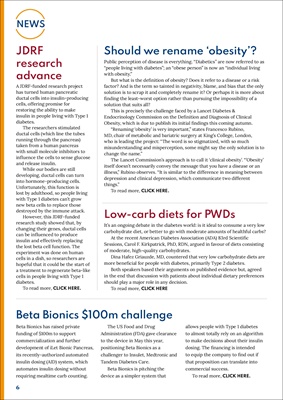
6
NEWS
Should we rename 'obesity'?
Public perception of disease is everything. "Diabetics" are now referred to as
"people living with diabetes"; an "obese person" is now an "individual living
with obesity."
But what is the definition of obesity? Does it refer to a disease or a risk
factor? And is the term so tainted in negativity, blame, and bias that the only
solution is to scrap it and completely rename it? Or perhaps it is more about
finding the least-worst option rather than pursuing the impossibility of a
solution that suits all?
This is precisely the challenge faced by a Lancet Diabetes &
Endocrinology Commission on the Definition and Diagnosis of Clinical
Obesity, which is due to publish its initial findings this coming autumn.
"Renaming 'obesity' is very important," states Francesco Rubino,
MD, chair of metabolic and bariatric surgery at King's College, London,
who is leading the project: "The word is so stigmatized, with so much
misunderstanding and misperception, some might say the only solution is to
change the name."
The Lancet Commission's approach is to call it 'clinical obesity'. "'Obesity'
itself doesn't necessarily convey the message that you have a disease or an
illness," Rubino observes. "It is similar to the difference in meaning between
depression and clinical depression, which communicate two different
things."
To read more, CLICK HERE.
JDRF
research
advance
A JDRF-funded research project
has turned human pancreatic
ductal cells into insulin-producing
cells, offering promise for
restoring the ability to make
insulin in people living with Type 1
diabetes.
The researchers stimulated
ductal cells (which line the tubes
running through the pancreas)
taken from a human pancreas
with small molecule inhibitors to
influence the cells to sense glucose
and release insulin.
While our bodies are still
developing, ductal cells can turn
into hormone-producing cells.
Unfortunately, this function is
lost by adulthood, so people living
with Type 1 diabetes can't grow
new beta cells to replace those
destroyed by the immune attack.
However, this JDRF-funded
research study showed that, by
changing their genes, ductal cells
can be influenced to produce
insulin and effectively replacing
the lost beta cell function. The
experiment was done on human
cells in a dish, so researchers are
hopeful that it could be the start of
a treatment to regenerate beta-like
cells in people living with Type 1
diabetes.
To read more, CLICK HERE.
Low-carb diets for PWDs
It's an ongoing debate in the diabetes world: is it ideal to consume a very low
carbohydrate diet, or better to go with moderate amounts of healthful carbs?
At the recent American Diabetes Association (ADA) 83rd Scientific
Sessions, Carol F. Kirkpatrick, PhD, RDN, argued in favour of diets consisting
of moderate, high-quality carbohydrates.
Dina Hafez Griauzde, MD, countered that very low carbohydrate diets are
more beneficial for people with diabetes, primarily Type 2 diabetes.
Both speakers based their arguments on published evidence but, agreed
in the end that discussion with patients about individual dietary preferences
should play a major role in any decision.
To read more, CLICK HERE
Beta Bionics $100m challenge
Beta Bionics has raised private
funding of $100m to support
commercialization and further
development of iLet Bionic Pancreas,
its recently-authorized automated
insulin dosing (AID) system, which
automates insulin dosing without
requiring mealtime carb counting.
The US Food and Drug
Administration (FDA) gave clearance
to the device in May this year,
positioning Beta Bionics as a
challenger to Insulet, Medtronic and
Tandem Diabetes Care.
Beta Bionics is pitching the
device as a simpler system that
allows people with Type 1 diabetes
to almost totally rely on an algorithm
to make decisions about their insulin
dosing. The financing is intended
to equip the company to find out if
that proposition can translate into
commercial success.
To read more, CLICK HERE.